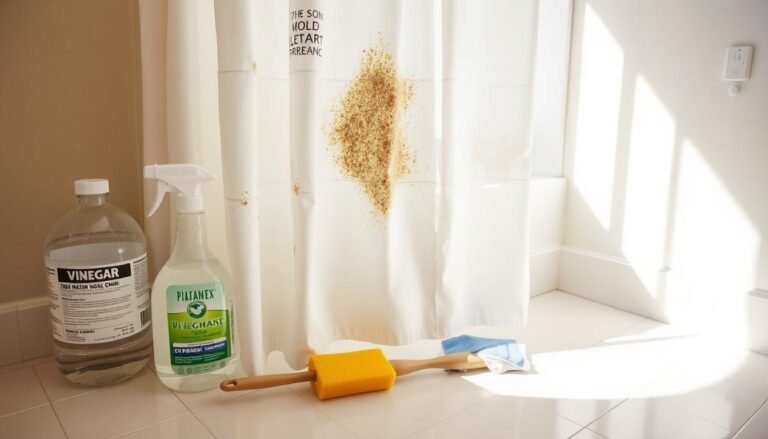Combat Mold on Plastic Shower Curtains Easily
Keeping your bathroom clean involves more than just aesthetics; it’s vital for your health too. Clean your plastic shower curtains every month. This is especially important in warm or humid areas where mold loves to grow. Even “mold-resistant” curtains can get moldy, so it’s important to fight mold regularly.
Making cleaning a habit is key to stop mold on plastic shower curtains. When you clean often and use good tips, you can stop mildew. This not only keeps your curtains looking good but also protects your health from mold risks.
Understanding Why Mold Grows on Plastic Shower Curtains
Mold loves warm and moist places. That’s why bathrooms, especially shower curtains, are perfect for it. Plastic curtains get wet a lot, have little airflow, and aren’t cleaned enough. This creates a perfect setup for mold. But why do plastic curtains attract mold? And how can we make our bathrooms less welcoming to it?
The Ideal Environment for Mold
To know how mold grows, we need to understand what it needs. Mold looks for moisture, warmth, and food. Bathrooms have all three. They get moisture from showers and warmth from the hot water.
What might not be so obvious is the food source for mold. Things like soap scum, body oils, and dead skin on the curtains feed the mold. Keeping the humidity low and using a squeegee can help stop the cycle.
Factors That Encourage Mold Growth
Several things can make mold worse. Not having enough air flow is a big one. Moisture stays without good airflow, helping mold grow. Using bathroom fans or opening windows can help keep mold away.
The shower curtain’s material also matters. Polyester attracts more mold than vinyl or plastic, which are easier to clean. A quick spray with cleaner every week can keep mold at bay.
Cleaning regularly is key. Wash your shower curtain, liner, rings, and rod monthly. Also, deep clean your bathroom weekly for a mold-free space. Proper care means your shower curtain could last up to five years.
Looking into these factors not only addresses do plastic shower curtains get mold, but also helps us learn how to prevent mold on plastic shower curtains. With regular care, you can have a cleaner and healthier shower area.
Do Plastic Shower Curtains Get Mold?
Yes, plastic shower curtains can grow mold. Materials like PVC, PEVA, EVA, nylon, and polyester are prone to this. Bathrooms offer mold the perfect conditions to thrive due to moisture and warmth.
Even shower curtain liners need cleaning monthly. PEVA and EVA materials are eco-friendlier and have fewer chemicals. Yet, they still attract mold in damp and warm settings. This means they must be cleaned regularly.
To prevent mold, a regular wash is key. Mix half a cup of white vinegar and baking soda with a mild detergent in the wash. Choose a gentle cycle with cool or lukewarm water to avoid curtain damage.
You can also spray the curtain weekly with a vinegar and water mix to block mold. Having weighted liners helps too. They keep the curtain stretched out, minimizing mold-friendly creases.
Keeping up with cleaning makes plastic curtains last up to 6 months. Polyester ones may last even longer since they’re easier to wash. Without proper care, though, you might have to replace your liners often.
| Material | Cleaning Frequency | Lifespan |
|---|---|---|
| PVC | Once a month | 4 to 6 months |
| PEVA/EVA | Once a month | 4 to 6 months |
| Nylon | Once a month | 4 to 6 months |
| Polyester | Once a month | Longer than plastic |
Effective Methods for Removing Mold from Plastic Shower Curtains
Dealing with mold on plastic shower curtains can be tough. But, there are effective ways to handle it. Knowing the best cleaning practices helps keep them in good shape and keeps your bathroom mold-free.
Using Bleach to Clean Plastic Shower Curtains
Bleach is great for killing mold on shower curtains. Mix one part bleach with three parts water for use. It works well for spot treatment and soaking. Remember, use color-safe bleach on dark or patterned curtains to avoid fading.
Alternative Cleaning Solutions: Vinegar and Baking Soda
For a natural clean, try vinegar and baking soda. Mix water and white vinegar, three to one, and apply it to the curtain for about 15 minutes. Then scrub and rinse it off. Baking soda works well too. You can make a paste to scrub stains or add it to the wash for a thorough clean. A weekly vinegar spray helps keep mold away.
Safe Machine Washing Techniques
Many shower curtains are safe to wash in a machine. Use regular detergent for fabric liners on a warm cycle. Add a bit of white vinegar for better results. Plastic curtains should go on a warm gentle cycle. Skip hot water and fabric softener to avoid damage and dirt buildup.
Hand Washing Procedures
If you can’t machine wash your curtain, hand wash it. Use hot water, detergent, and baking soda for dirty curtains. After soaking, scrub off the mold gently. Rinse well and hang it to dry fully. This helps prevent new mold from forming.
Keeping your shower curtain clean is key to avoiding mold. This guide shows the best ways to clean. Following these tips will help keep your bathroom clean and safe.
Preventing Mold on Plastic Shower Curtains
Keeping your shower curtain mold-free is crucial for a healthy bathroom. Mold can grow in 24-48 hours if moisture and food are present. To avoid this, add regular cleaning and upkeep to your to-do list.
Routine Cleaning and Maintenance
Wash your shower curtain regularly to stop mold from getting a foothold. Experts advise doing this every one to two months. Use a gentle bleach, detergent, vinegar, or baking soda in the wash to kill mold spores. Also, wash it with towels on a cool setting to clean it well without damage.
Run the bathroom fan for 30 minutes after showering to cut down on moisture. Keep the curtain open to dry. This will help keep mold away.
Using Mold-Resistant Shower Curtains
Choosing a mold-resistant shower curtain adds extra protection. These curtains are less likely to get mold, but they still need regular cleaning. Use products like Arm & Hammer Baking Soda and Lucy’s Distilled White Vinegar for better results. Also, fix leaks right away, avoid water buildup, and air out the bathroom.
Dry and store bath items outside the shower to avoid mold. This discussion offers more tips on shower curtain care. It also talks about glass doors as a pricier but effective alternative to prevent mold.

Hey there, I’m Alex Hanson and I’m passionate about all things covers! Whether you’re looking for a car seat cover to protect your vehicle or an oven cover to keep your kitchen clean, I’m here to help. With years of experience in the industry, I have plenty of knowledge and insights to share with my readers. So, if you care about protecting your belongings and making them look their best, you’re encouraged to read my blog as I explore the perfect cover for every need.







